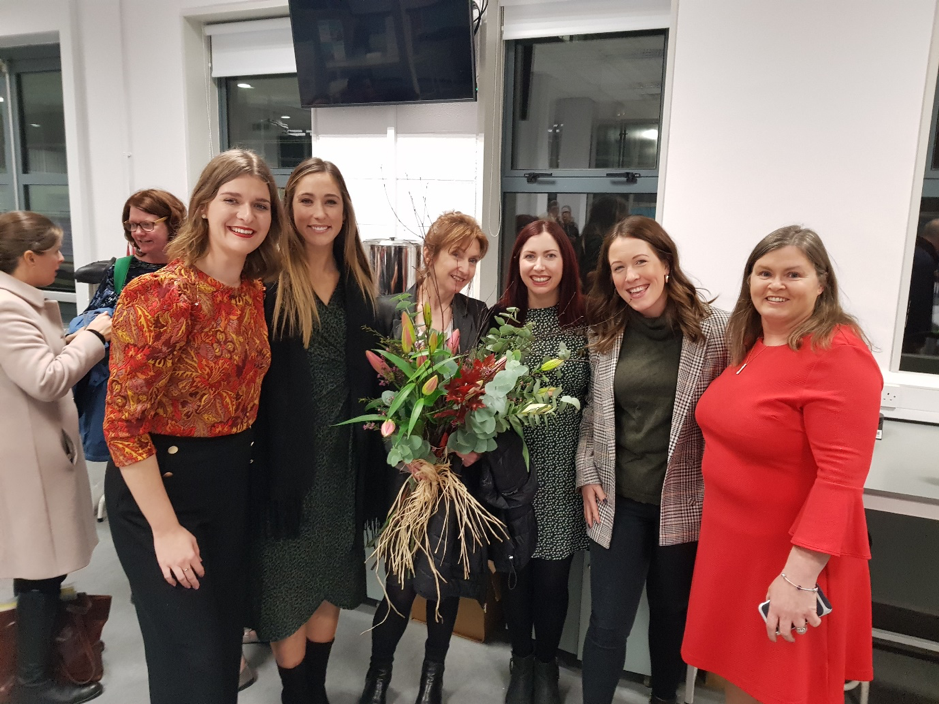
 It was such a pleasure to be part of the Improving Gender Balance in Ireland project over the past two years and we celebrated our involvement on Monday 18th November when Ms Bourke, Ms Byrnes, Ms Browne and Ms Considine attended the School Awards Ceremony in DCU. The school exhibited posters created by each department as part of our Whole School Equality Plan and Ms Bourke, Ms Byrnes and Ms Considine participated in the panel discussion before the presentation of the awards by Minister Mary Mitchell O’Connor. In her speech the minister presented the challenging message of ‘gender inequality’ and urged young females to ‘reach to the stars’. The press release below captures the essence of the ministers message.
It was such a pleasure to be part of the Improving Gender Balance in Ireland project over the past two years and we celebrated our involvement on Monday 18th November when Ms Bourke, Ms Byrnes, Ms Browne and Ms Considine attended the School Awards Ceremony in DCU. The school exhibited posters created by each department as part of our Whole School Equality Plan and Ms Bourke, Ms Byrnes and Ms Considine participated in the panel discussion before the presentation of the awards by Minister Mary Mitchell O’Connor. In her speech the minister presented the challenging message of ‘gender inequality’ and urged young females to ‘reach to the stars’. The press release below captures the essence of the ministers message.
Improving Gender Balance Ireland is a DCU led initiative aiming to improve students’ experience of STEM subjects and increase female participation
Twenty-eight schools from across the Dublin and Leinster region will attend the inaugural Improving Gender Balance Ireland Programme awards taking place this evening in Dublin City University attended by the Minister for Higher Education and Skills, Mary Mitchell O’Connor, TD.
The DCU led initiative aims to improve students’ experience of STEM (Science, Technology, Engineering and Maths) subjects and increase female participation in these subjects.
The initiative was established to tackle the gender gap in STEM (Science, Technology, Engineering and Maths) by working to improve students’ experiences of science in their first three years of secondary school and ensure that all students are able to make informed and unbiased choices around physics and STEM careers.
The programme is also examining the challenges faced by science teachers in teaching STEM subjects and promoting a “whole-school” approach to STEM; encouraging a positive and inclusive attitude towards the uptake of all curricular subjects.
The Improving Gender Balance Ireland programme builds on programmes that have been successfully implemented by the Institute of Physics in England and Scotland.
Findings from across these three programmes show that the type of school affects student uptake and the sense of belonging in physics.
Analyses by DCU has found striking differences in the uptake of Physics among girls in mixed-sex schools compared with girls in single-sex schools.
For example, the impact of the programme in England has seen the number of girls taking AS-level physics in the participating schools drastically increasing from 16 to 52 – more than trebling over two years. The impact figures for the partnering schools in Ireland have yet to be determined.
The programme is led by researchers, Associate Professor Eilish McLoughlin, Ms. Deirdre O’Neill and Ms. Georgina Fagan, from CASTeL (Centre for Advancement of STEM Teaching and Learning) and the School of Physical Sciences at DCU in a strategic partnership with the Institute of Physics in Ireland and Science Foundation Ireland.
Associate Professor Eilish McLoughlin, Director of CASTeL and Deputy Head of the School of Physical Sciences, DCU said:
“Providing on-going and sustained professional learning for teachers is crucial to deepening confidence and competence in teaching STEM subjects and building students’ confidence and resilience to take up STEM subjects at Leaving Certificate and ultimately pursue careers in STEM.
The whole thing about improving gender balance is not just simply about getting more girls to do physics. What is increasing the number of girls doing physics is valid for all students, to make informed and unbiased choices around all subjects.
In particular, we need a national programme to tackle unconscious bias and stereotyping in schools to achieve inclusion and equality for all students”.
Ms. Deirdre O’Neill, School of Physical Sciences DCU, who is conducting her PhD research on the implementation and impact of this programme said:
“Our study showed the extent to which gender stereotyping can occur in schools, and how it can create barriers to subject choice.
From our research and pilot projects, we can deduce that further work to widen participation in physics and STEM careers should operate across the whole school, involving students, teachers of science and of other subjects and school management”.
Seven second level schools were involved in the pilot phase, between 2017 and 2019. Initial figures showed that 405 teachers, of which 51 were science teachers took part in 15 in-school workshops with all teaching staff to raise awareness of unconscious bias and to support the development of inclusive and equality practices in the whole school environment.
In addition, a further 60 in-school workshops were held with all science teachers to improve teachers’ confidence and competence in teaching physics at Junior Cycle level.
A further 1200 teachers from 21 schools (13 mixed, 3 single sex boys and 5 single sex girls schools) are taking part in the second phase of the programme which commenced in August of this year.
They will participate in in-school workshops to raise awareness of unconscious bias.
The 150 science teachers in these schools are also attending a series of regional workshops to support Physics teaching and learning.
Ms. Deirdre O’Neill, School of Physical Sciences DCU and Associate Professor Eilish McLoughlin, with the team from St Mary’s after the event.